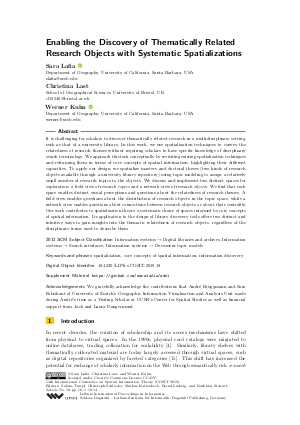@InProceedings{lafia_et_al:LIPIcs.COSIT.2019.18,
author = {Lafia, Sara and Last, Christina and Kuhn, Werner},
title = {{Enabling the Discovery of Thematically Related Research Objects with Systematic Spatializations}},
booktitle = {14th International Conference on Spatial Information Theory (COSIT 2019)},
pages = {18:1--18:14},
series = {Leibniz International Proceedings in Informatics (LIPIcs)},
ISBN = {978-3-95977-115-3},
ISSN = {1868-8969},
year = {2019},
volume = {142},
editor = {Timpf, Sabine and Schlieder, Christoph and Kattenbeck, Markus and Ludwig, Bernd and Stewart, Kathleen},
publisher = {Schloss Dagstuhl -- Leibniz-Zentrum f{\"u}r Informatik},
address = {Dagstuhl, Germany},
URL = {https://drops.dagstuhl.de/entities/document/10.4230/LIPIcs.COSIT.2019.18},
URN = {urn:nbn:de:0030-drops-111102},
doi = {10.4230/LIPIcs.COSIT.2019.18},
annote = {Keywords: spatialization, core concepts of spatial information, information discovery}
}

 Creative Commons Attribution 3.0 Unported license
Creative Commons Attribution 3.0 Unported license



































